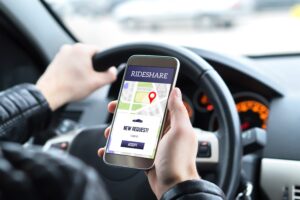
Rideshare services like Uber and Lyft have revolutionized the transportation industry in recent years—particularly in large metro areas like Tampa. Many people use Uber or Lyft to get home after a night of drinking, and others simply use the service to get around town without having to use taxis or public transportation.
Whatever their reasons for using a rideshare service, people run the risk of serious injuries in rideshare accidents. Whether an Uber or Lyft driver caused a car accident that injured you, or you sustained injuries in a wreck another driver caused with a rideshare vehicle, you have options for obtaining the compensation you need.
The Tampa rideshare accident attorneys at Apex Law have many years of experience helping injured clients throughout the greater Tampa metro with their complex claims resulting from an Uber or Lyft accident. We also handle cases involving Tampa tornado damage, Tampa brain injuries, property damage, bicycle accidents, and wrongful death. We will review your claim at no cost and advise you of your options. You can also count on us to fight hard to help you get the maximum compensation you deserve. Contact us today at (813) 444-5212 for your free consultation.
Why Choose Our Tampa Rideshare Attorneys?

The founding partners of Apex Law, Tampa injury attorneys, Jeff Constantinos and Chris Castillo, have more than 20 years of collective experience, and we have achieved remarkable success fighting for the rights and entitlements of our clients.
We believe everyone deserves top-tier legal counsel, and our law firm offers the following benefits:
- We will devote our time and attention to your needs. You are not just another number to us, and you can trust we will take an active interest in your case.
- Every member of our legal team is personable, compassionate, and friendly. We will treat you like a member of the family as we work diligently to help you through this difficult and uncertain time in your life.
- Our lawyers have earned consistent awards and honors from our peers for our outstanding professionalism and legal abilities. We are tenacious negotiators and fierce litigators with a long record of securing substantial settlements and verdicts for our clients.
The attorneys at Apex Law have received numerous five-star client reviews and dozens of powerful testimonials from our satisfied clients. We offer free consultations, and we work on a contingency fee basis. This means you won’t pay us anything upfront to represent you, and we will only accept a fee if we recover compensation for you.
Contact Apex Law today to see how we can best help you get the full and fair financial recovery you need to focus on your physical recovery following a Tampa Uber or Lyft accident.
Why Do I Need a Tampa Uber Accident Attorney?
Rideshare accidents are typically more complex than other motor vehicle accident claims because the crashes usually involve several parties and insurance companies. Depending on the nature and cause of the accident, you may have to deal with the at-fault driver’s insurance, the Uber or Lyft driver’s private insurance, the rideshare company’s insurance, and maybe even your own.
Our attorneys will:
- Understand insurance coverage. Uber provides complex insurance coverage for both their drivers and passengers. Our experienced Uber accident attorneys can navigate the insurance claims process and so you receive the maximum compensation available under Uber's insurance policies.
- Deal with insurance companies. Insurance companies often minimize their payouts or deny claims altogether. Having an attorney on your side can level the playing field. They can handle all communication and negotiations with insurance companies, protecting your rights and fighting for fair compensation for you. An attorney can also deal with any other insurance companies involved, including your own, so you don’t have to worry about saying or doing something that would cause an insurer to deny your claim.
- Determine liability. Liability in Uber accidents can grow complicated, especially if multiple parties are involved, such as other drivers or pedestrians. Our skilled attorneys can investigate the accident, gather evidence, and determine fault. They will work to hold the responsible parties accountable for your injuries and damages.
- Assess damages. An Uber accident can result in medical expenses, property damage, lost income, pain, suffering, and more. Our attorneys can evaluate the full extent of your damages to seek appropriate compensation for all aspects of your case.
- Provide legal knowledge and advocacy. Rideshare companies make navigating the legal process complex and overwhelming. Our experienced rideshare accident attorneys understand the unique laws and regulations that apply to rideshare services. We can provide you with trustworthy legal advice, guide you through the legal process, and advocate for you.
Ultimately, hiring our Tampa Uber accident attorneys can provide you with the knowledge, support, and representation you need to protect your rights and pursue a fair settlement or verdict in your case.
What Is the Difference Between a Rideshare Company and a Taxi Company?

The main difference between a rideshare company and a taxi company lies in their business models and the way they operate.
Here are a few key distinctions:
- Business model. Rideshare companies like Uber and Lyft operate on a technology-based platform that connects drivers (who use their personal vehicles) with passengers through a mobile app. These companies do not own the vehicles or employ the drivers directly. In contrast, taxi companies own a fleet of vehicles and employ drivers as their employees or independent contractors.
- Accessibility. Rideshare services typically operate on a peer-to-peer basis, meaning that anyone who meets the company's requirements can sign up to drive. This has led to increased accessibility and a larger pool of available drivers compared to traditional taxi services, which typically have more rigorous screening and licensing processes.
- Pricing. Rideshare companies often use dynamic pricing models, where the fares fluctuate based on demand, distance, and time. Taxi companies, on the other hand, generally follow fixed pricing structures set by local regulations or taxi commissions.
- Technology. Rideshare companies heavily rely on mobile apps for their operations. Passengers can request rides, track their drivers, and make payments through the app. Taxi companies have also embraced technology in recent years, but the level of integration may vary, and traditional dispatch systems are still common.
- Regulation. Rideshare companies have faced regulatory challenges in many jurisdictions around the world. They often operate under different statutes and regulations than traditional taxis, leading to debates about licensing, insurance requirements, background checks, and other safety measures.
The specific differences between rideshare and taxi companies may vary depending on the city or county in question.
Who Must Pay for My Rideshare Accident in Tampa?
Determining liability in a rideshare accident in Tampa depends on the accident.
Our lawyers can hold many parties liable for your accident, including:
- Rideshare driver. If the rideshare driver caused the accident through their negligence or misconduct, you may hold them liable for damages. This can include instances involving a distracted, speeding, or intoxicated driver.
- Other drivers. If another driver contributed to or caused the collision, you may obtain compensation from them. The rideshare driver and another driver may share responsibility for the accident.
- Rideshare company. Rideshare companies like Uber and Lyft have insurance policies that cover accidents involving their drivers. In certain situations, if an on-duty rideshare driver actively transported passengers or went to pick up passengers, the rideshare company's insurance policy may come into play.
- Third parties. Liability can also extend to pedestrians, bicyclists, or even manufacturers of defective vehicle parts if their actions or products contributed to the accident.
Determining liability often requires a thorough investigation of the accident, collection of evidence, and analysis of relevant laws and regulations. Consult an experienced rideshare accident attorney in Tampa who can assess your case, gather evidence, and advocate for your rights to appropriately assign liability and recover the compensation you deserve.
How Does Uber/Lyft Insurance Work?
Uber and Lyft insure their drivers and passengers against accidents. The insurance coverage that Uber/Lyft provides depends on the status of the driver at the time of the accident.
Here's how Uber insurance works:
- When the Uber app is off. If the driver turns the app off, they are not working for Uber. The driver's personal auto insurance policy would apply in these accidents.
- When the Uber app is on but a fare has not actively engaged the driver. If the driver turns the app on, but they are not actively transporting a passenger, Uber provides liability coverage in an accident. This coverage supplements the driver's personal auto insurance policy and covers up to $50,000 per person for bodily injury, $100,000 per accident for bodily injury, and $25,000 per accident for property damage.
- When the driver actively engages a passenger. When the driver actively transports a passenger, Uber provides more extensive coverage. This includes up to $1 million in liability coverage for third-party bodily injury and property damage, as well as uninsured/underinsured motorist coverage in certain situations.
Uber's insurance coverage depends on the driver's compliance with Uber's policies and local laws. If the driver violates these requirements, it could affect their insurance coverage and liability after an accident.
If you were a passenger in an Uber accident in Tampa and suffered injuries, consult an experienced rideshare accident attorney who can navigate the insurance claims process and recover the maximum compensation available under Uber's insurance policies.
What Should I Do After a Rideshare Accident in Tampa?
After a rideshare accident in Tampa, to ensure your health and well-being and protect your legal rights:
- Seek medical attention. Make your health and safety your top priority. Check yourself and others in the accident for injuries and seek emergency medical attention. Even if you don't feel injured at the accident scene, get a medical evaluation to rule out any hidden injuries that may manifest later.
- Contact the authorities. Call the police to report the accident and provide them with accurate details of the incident. A police report can contain crucial evidence for your insurance claim and any potential legal proceedings.
- Document the accident scene. If you physically can, gather as much evidence as possible from the accident scene. Take photos or videos of the vehicles involved, the damages, road conditions, traffic signs, and any visible injuries. Your attorney can use this evidence later to support your insurance claim or legal case.
- Exchange information. Obtain the contact information, names, and insurance details of all parties in the accident, including the rideshare driver. Also, gather contact information from any witnesses at the scene.
- Report the accident to the rideshare company. If you were a passenger in the rideshare vehicle, report the accident to the rideshare company (Uber, Lyft, etc.) through their app or customer support.
- Preserve records. Keep all relevant documents related to the accident, such as medical records, police reports, insurance correspondence, and receipts for any expenses incurred because of the accident.
- Consult our rideshare accident attorney. Contact an experienced rideshare accident attorney at Apex Law. We can provide legal advice specific to your situation, guide you through the claims process, and protect your rights. Our attorneys can gather evidence, negotiate with insurance companies, and pursue any legal action, if necessary.
Remember, consult us as early in the process as possible so you take the appropriate steps and protect your interests following a rideshare accident.
What Injuries Can People Suffer in Rideshare Accidents?
In rideshare accidents, individuals can sustain a wide range of injuries, which can vary in severity depending on the circumstances of the accident.
Common injuries that can occur in a rideshare accident include:
- Whiplash. Whiplash results from the sudden back-and-forth motion of the head and neck. It can lead to neck pain, stiffness, headaches, and muscle spasms.
- Soft tissue injuries. These injuries damage muscles, tendons, or ligaments. They can include sprains, strains, contusions, and bruising. Soft tissue injuries can cause pain, swelling, and limited mobility.
- Broken bones. Rideshare accidents can fracture arms, legs, ribs, and collarbones, and other bones. Fractures may require immobilization, surgery, or other medical interventions.
- Head and brain injuries. Traumatic brain injuries (TBI) can occur when the head or suffers a bump, blow or jolt. TBIs can include concussions, contusions, or hemorrhages. These injuries may result in cognitive impairments, memory loss, headaches, dizziness, or behavior changes.
- Spinal cord injuries. Severe rideshare accidents can cause spinal cord injuries, which can result in partial or complete paralysis, loss of sensation, and other long-term complications.
- Internal injuries. The impact in an accident can injure the liver, spleen, kidneys, or lungs. These injuries may require immediate medical attention and surgery.
- Psychological injuries. Rideshare accidents can also leave psychological impacts, such as post-traumatic stress disorder (PTSD), anxiety, depression, or emotional distress.
Seek medical attention promptly after a rideshare accident, even if you don't immediately feel injured, as some injuries may have delayed symptoms. A thorough medical evaluation can identify and document any injuries and provide appropriate treatment. Additionally, a rideshare accident attorney can protect your rights and pursue compensation for your injuries and damages.
What Damages Can I Recover After a Tampa Rideshare Accident?

After a rideshare accident, victims can recover compensation that falls into two main categories: economic damages and non-economic damages. Here are some common damages you may recover:
- Medical expenses. You can seek compensation for medical expenses related to your injuries, including emergency room visits, hospital stays, surgeries, medications, rehabilitation, physical therapy, and ongoing medical treatment.
- Lost income. If your injuries result in missed work or reduced earning capacity, you may recover lost income or loss of future earning capacity.
- Pain and suffering. Rideshare accident victims can seek compensation for physical pain, emotional distress, mental anguish, and the loss of enjoyment of life caused by the accident and resulting injuries.
- Property damage. If the accident damaged your personal property, such as your vehicle or personal belongings, you can pursue compensation for their repair or replacement.
- Disability and disfigurement. If the accident causes long-term or permanent disabilities or disfigurement, you may seek additional compensation to account for the impact on your quality of life and future opportunities.
- Loss of consortium. If the accident affects your relationships with your spouse or family members, they may seek damages for the loss of companionship, support, or services.
- Punitive damages. Certain cases involving extreme negligence or intentional misconduct, may involve punitive damages. These damages punish the at-fault party and deter similar behavior.
An experienced Tampa rideshare attorney can evaluate your claim to determine the damages you can pursue to cover all costs of your injuries and losses.
Contact a Tampa Rideshare Accident Lawyer Today
The Tampa rideshare accident attorneys at Apex Law are here for you. We understand what you are going through, and you can rely on us for personalized, zealous, and effective legal counsel and representation each step of the way.
Contact us today at (813) 444-5212 for your free claim consultation and evaluation.
Visit Our Car Accident & Personal Injury Law Firm in Tampa, FL
Apex Law Firm, PLLC
412 E Madison St Suite 1206, Tampa, FL 33602
(813) 444-5212

